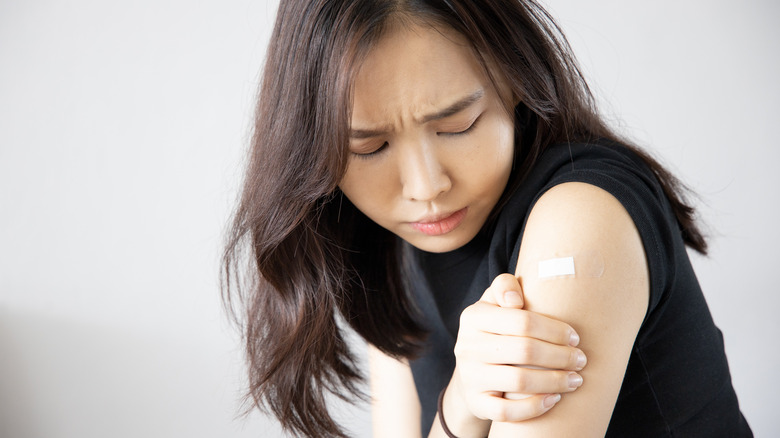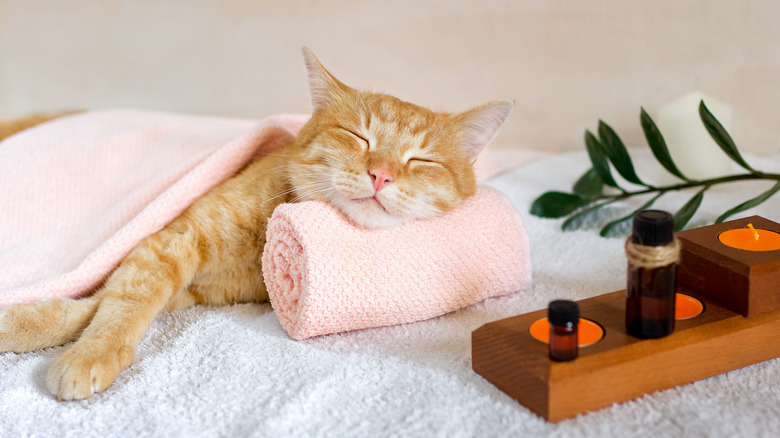The Best Way To Deal With Your COVID-19 Vaccine Side Effects
While getting fully vaccinated will help protect you from getting COVID-19, you're probably going to experience some uncomfortable side effects for one to three days after. That just means your vaccine is working, and your immune system is learning how to fight the virus should you ever get it. You might not get any side effects from your shots, but that doesn't mean the vaccine isn't working. Not everyone gets the common side effects, and that's okay. Your immune system is still working hard, and you lucked out. If you have had COVID-19 and get vaccinated, you might experience more severe side effects than others. They'll still go away in a few days.
Side effects start with some redness, soreness, pain, or swelling at the injection site. Think about which arm you should get it in before you go to your appointment. If you use your right arm more than your left, get poked in your left arm. If you sleep on your left side, go with the right arm — you probably won't be sleeping on the side you got the shot in for a few nights. Dampen a clean cloth with cold water and hold it on your arm to help reduce swelling, pain, and soreness. Move that arm around a bit to help with those symptoms, too (via the Centers for Disease Control and Prevention).
Be prepared to rest
Be prepared to take it easy for one to three days after you get your shot. While you shouldn't take any pain relievers like acetaminophen or ibuprofen before your shot, you can afterward if you need to. Have a water bottle and acetaminophen at the ready, so you can stay hydrated and pop a couple them if you need to. Common COVID-19 vaccine side effects include fever, fatigue, nausea, body aches, joint pain, chills, headaches, and sometimes swollen lymph nodes. Acetaminophen and staying hydrated can help with those symptoms.
Make some meals ahead of time to warm them up post-vaccine because you might not have the energy or feel well enough to cook. Make up to three dinners and stow them in the freezer to warm up when you need them, or stash some money aside for food deliveries. Limit alcohol, eat healthily, drink plenty of water, and adjust your workouts. Avoid intense workouts in the few days after your vaccine.
Take some time off of work if you need to. Appointments for vaccinations are filling up fast, so you won't always be able to get it on a Friday, so you can rest on the weekend. You might need to use a couple of sick days so you can take it easy, especially if you're getting your second shot — second shot side effects could be more intense than the first time (via Bustle, Methodist Health System, and the CDC).
When to call your doctor
When you get the vaccine, you'll be asked to stay in an observation area for 15 minutes in the rare event that you have a severe allergic reaction called anaphylaxis. While it is rare, it can be fatal if not treated. Treatment consists of a shot of epinephrine, possibly an IV with an antihistamine and oxygen, and an inhaler with medicine to help you breathe. That's why each vaccination location must have an epinephrine kit for anyone who might have this severe allergic reaction.
You may have to wait in the observation area for 30 minutes if you have had an allergic reaction to a vaccine in the past. Call 911 immediately if you have any symptoms of a severe allergic reaction after you leave the vaccination site. Symptoms are wheezing, trouble breathing, hives, or swelling of the tongue. If you have a severe allergic reaction, the CDC recommends that you not get the second shot.
If the pain or swelling in your arm at the injection site gets worse 24 hours after your shot, call your doctor. Your vaccine side effects should go away after a few days. If they get severe or don't seem to be going anywhere after this period, call your doctor. You and your doctor can discuss the next steps if necessary (via the CDC, WHO, and the Mayo Clinic).


